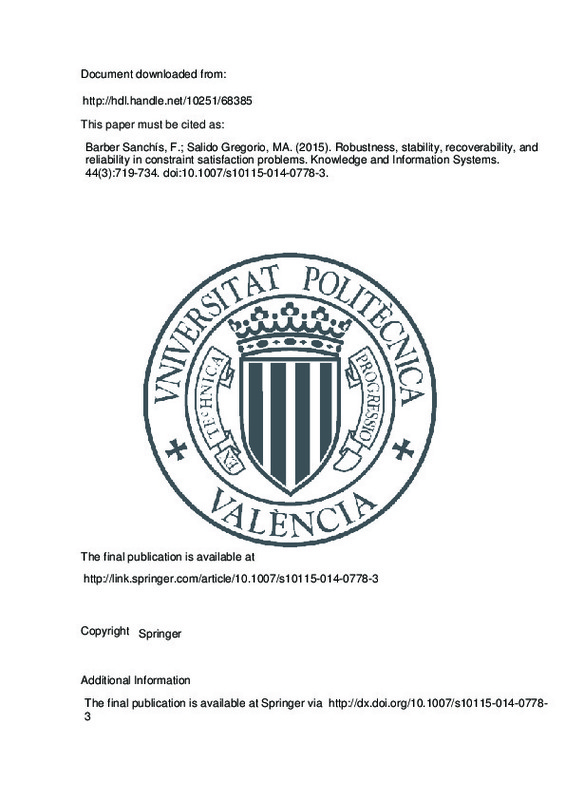Abril M, Barber F, Ingolotti L, Salido MA, Tormos P, Lova A (2008) An assessment of railway capacity. Transp Res Part E 44(5):774–806
Barber F (2000) Reasoning on intervals and point-based disjunctive metric constraints in temporal contexts. J Artif Intell Res 12:35–86
Bartak R, Salido MA (2011) Constraint satisfaction for planning and scheduling problems. Constraints 16(3):223–227
[+]
Abril M, Barber F, Ingolotti L, Salido MA, Tormos P, Lova A (2008) An assessment of railway capacity. Transp Res Part E 44(5):774–806
Barber F (2000) Reasoning on intervals and point-based disjunctive metric constraints in temporal contexts. J Artif Intell Res 12:35–86
Bartak R, Salido MA (2011) Constraint satisfaction for planning and scheduling problems. Constraints 16(3):223–227
Bertsimas D, Sim M (2004) The price of robustness. Oper Res 52(1):35–53
Climent L, Wallace R, Salido M, Barber F (2013) Modeling robustness in CSPS as weighted CSPS. In: Integration of AI and OR techniques in constraint programming for combinatorial optimization problems CPAIOR 2013, pp 44–60
Climent L, Wallace R, Salido M, Barber F (2014) Robustness and stability in constraint programming under dynamism and uncertainty. J Artif Intell Res 49(1):49–78
Dechter R (1991) Temporal constraint network. Artif Intell 49:61–295
Hazewinkel M (2002) Encyclopaedia of mathematics. Springer, New York
Hebrard E (2007) Robust solutions for constraint satisfaction and optimisation under uncertainty. PhD thesis, University of New South Wales
Hebrard E, Hnich B, Walsh T (2004) Super solutions in constraint programming. In: Integration of AI and OR techniques in constraint programming for combinatorial optimization problems (CPAIOR-04), pp 157–172
Jen E (2003) Stable or robust? What’s the difference? Complexity 8(3):12–18
Kitano H (2007) Towards a theory of biological robustness. Mol Syst Biol 3(137)
Liebchen C, Lbbecke M, Mhring R, Stiller S (2009) The concept of recoverable robustness, linear programming recovery, and railway applications. In: LNCS, vol 5868
Papapetrou P, Kollios G, Sclaroff S, Gunopulos D (2009) Mining frequent arrangements of temporal intervals. Knowl Inf Syst 21:133–171
Rizk A, Batt G, Fages F, Solima S (2009) A general computational method for robustness analysis with applications to synthetic gene networks. Bioinformatics 25(12):168–179
Rossi F, van Beek P, Walsh T (2006) Handbook of constraint programming. Elsevier, New York
Roy B (2010) Robustness in operational research and decision aiding: a multi-faceted issue. Eur J Oper Res 200:629–638
Szathmary E (2006) A robust approach. Nature 439:19–20
Verfaillie G, Schiex T (1994) Solution reuse in dynamic constraint satisfaction problems. In: Proceedings of the 12th national conference on artificial intelligence (AAAI-94), pp 307–312
Wallace R, Grimes D, Freuder E (2009) Solving dynamic constraint satisfaction problems by identifying stable features. In: Proceedings of international joint conferences on artificial intelligence (IJCAI-09), pp 621–627
Wang D, Tse Q, Zhou Y (2011) A decentralized search engine for dynamic web communities. Knowl Inf Syst 26(1):105–125
Wiggins S (1990) Introduction to applied nonlinear dynamical systems and chaos. Springer, New York
Zhou Y, Croft W (2008) Measuring ranked list robustness for query performance prediction. Knowl Inf Syst 16:155–171
[-]







![[Cerrado]](/themes/UPV/images/candado.png)


